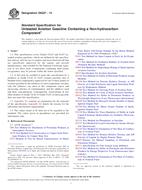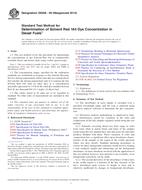We need your consent to use the individual data so that you can see information about your interests, among other things. Click "OK" to give your consent.
ASTM D6079-11
Standard Test Method for Evaluating Lubricity of Diesel Fuels by the High-Frequency Reciprocating Rig (HFRR)
STANDARD published on 1.3.2011
The information about the standard:
Designation standards: ASTM D6079-11
Note: WITHDRAWN
Publication date standards: 1.3.2011
SKU: NS-33678
The number of pages: 8
Approximate weight : 24 g (0.05 lbs)
Country: American technical standard
Category: Technical standards ASTM
The category - similar standards:
Annotation of standard text ASTM D6079-11 :
Keywords:
boundary lubrication, diesel fuel, friction, HFRR, lubricity, wear, Wear testing--petroleum products, Diesel engine fuel oils, Friction/frictional properties--petroleum applications, HFRR (high-frequency reciprocating rig), Industrial petroleum products, Lubricity/lubricating properties, Petroleum products, Reciprocating rig, ICS Number Code 75.160.20 (Liquid fuels)
Additional information
| Significance and Use | ||||||||||||||||
|
Diesel fuel injection equipment has some reliance on lubricating properties of the diesel fuel. Shortened life of engine components, such as diesel fuel injection pumps and injectors, has sometimes been ascribed to lack of lubricity in a diesel fuel. The trend of HFRR test results to diesel injection system pump component distress due to wear has been demonstrated in pump rig tests for some fuel/hardware combinations where boundary lubrication is believed to be a factor in the operation of the component. The wear scar generated in the HFRR test is sensitive to contamination of the fluids and test materials, the temperature of the test fuel, and the ambient relative humidity. Lubricity evaluations are also sensitive to trace contaminants acquired during test fuel sampling and storage. The HFRR and Scuffing Load Ball on Cylinder Lubricity Evaluator (SLBOCLE, Test Method D6078) are two methods for evaluating diesel fuel lubricity. No absolute correlation has been developed between the two test methods. The HFRR may be used to evaluate the relative effectiveness of diesel fuels for preventing wear under the prescribed test conditions. Correlation of HFRR test results with field performance of diesel fuel injection systems has not yet been determined. This test method is designed to evaluate boundary lubrication properties. While viscosity effects on lubricity in this test method are not totally eliminated, they are minimized. |
||||||||||||||||
| 1. Scope | ||||||||||||||||
|
1.1 This test method covers the evaluation of the lubricity of diesel fuels using a high-frequency reciprocating rig (HFRR). 1.2 This test method is applicable to middle distillate fuels, such as Grades No. 1-D S15, S500, and S5000, and Grades No. 2-D S15, S500, and S5000 diesel fuels, in accordance with Specification D975; and other similar petroleum-based fuels which can be used in diesel engines. This test method is applicable to biodiesel blends. B5 was included in the round robin program that determined the precision statement. Note 1—It is not known that this test method will predict the performance of all additive/fuel combinations. Additional work is underway to establish this correlation and future revisions of this test method may be necessary once this work is complete. 1.3 The values stated in SI units are to be regarded as standard. No other units of measurement are included in this standard. 1.4 This standard does not purport to address all of the safety concerns, if any, associated with its use. It is the responsibility of the user of this standard to establish appropriate safety and health practices and determine the applicable regulatory limitations prior to use. Specific warning statements are given in Section 7. |
||||||||||||||||
| 2. Referenced Documents | ||||||||||||||||
|
Similar standards:
Historical
1.6.2011
Historical
1.5.2014
Historical
1.5.2014
Historical
1.11.2012
Historical
1.11.2012
Historical
1.10.2013
We recommend:
Technical standards updating
Do you want to make sure you use only the valid technical standards?
We can offer you a solution which will provide you a monthly overview concerning the updating of standards which you use.
Would you like to know more? Look at this page.



 ASTM D6217-11
ASTM D6217-11 ASTM D6227-14
ASTM D6227-14 ASTM D6258-09(2014)..
ASTM D6258-09(2014).. ASTM D6277-07(2012)..
ASTM D6277-07(2012).. ASTM D6278-12e1
ASTM D6278-12e1 ASTM D6296-98(2013)..
ASTM D6296-98(2013)..
 Cookies
Cookies
